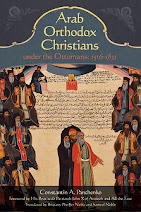Arabic original here.
Saint Ephrem the Syrian (1):
Repentance with Tears
The faithful are passionately fond of the spiritual writings of Saint Ephrem. What first attracts attention to them is his call to humility and repentance. For him, repentance is tied to judgment and tears, remembrance of judgment and the shedding of tears.
This is not for the sake of self-torture, but for the sake of attaining the kingdom according to the Gospel's commandment: "Repent, for the kingdom of heaven has drawn near" (Matthew 3:2 and 4:17). He warns sinners about falling into despair and encourages them to repent and not to lose hope in God's mercy. He tells them:
"I ask all those whose conscience torments them on account of their sins not to despair... but rather to draw near to God without fear, to weep before Him, and not to lose hope because the Lord is greatly pleased with those who repent and joyfully accepts their return to Him because He says through the mouth of Hosea, 'After all this, return to Me' and also through the Evangelist Matthew, 'Come to Me, all you who labor and are heavy laden, and I will give you rest' (Matthew 11:28), so do not despair, even if you sin."
But how do we repent?
Repentance is returning to God. This path, the path of return, requires hatred of sin, to the point of hating the sinful life: "If anyone comes to Me and does not hate ... his own life also, he cannot be My disciple" (Luke 14:26).
From there, repentance requires keeping love of one's brothers, especially the weak, because he who has this has the love of God. It also requires humility because the humble person resembles God in that he sorrows and suffers along with the sinner and does not despise him. In this way, he purifies his own soul. All of this is in accordance with what the Lord has said: "Assuredly, I say to you, inasmuch as you did it to one of the least of these My brethren, you did it to Me" (Matthew 25:4). The question, the question of repentance, naturally requires effort because the kingdom of heaven suffers violence, and violent men take it by force. War has been declared against the passions and lusts, against the snares of Satan, and so the saint says, "We have been bound by our lusts as with chains of iron. No one struggles to be freed of them, but rather his breast is gladdened as he is bound by them. What evil snares are these, devised by the wicked devil? How could he make our minds darkened so that we be concerned with everything that is contrary and prefer what harms us over good things to come?"
This struggle of repentance will make us worthy to see Christ risen in glory, either partially, as in a mirror, through the prayer of the heart, the Jesus Prayer, or directly after illumination. This also gives us a foretaste, while we are on this earth, of the kingdom that is Christ's glory, which is heaven for those who have attained pure love and is seen in the form of uncreated light. Those who have attained extreme selfishness see God's glory as an immaterial burning fire: this is hell.
Indeed, sin destroys. It is true what is said in the hymns: "Evil is complacency, great is repentance."
He who digs his grave in his heart smashes the man of sin and opens the gate of the resurrection. Saint Ephrem washes his sins with his tears and his heart rejoices with the grace of God.
+Ephrem
Metropolitan of Tripoli, al-Koura and their Dependencies
Saint Ephrem the Syrian (1):
Repentance with Tears
The faithful are passionately fond of the spiritual writings of Saint Ephrem. What first attracts attention to them is his call to humility and repentance. For him, repentance is tied to judgment and tears, remembrance of judgment and the shedding of tears.
This is not for the sake of self-torture, but for the sake of attaining the kingdom according to the Gospel's commandment: "Repent, for the kingdom of heaven has drawn near" (Matthew 3:2 and 4:17). He warns sinners about falling into despair and encourages them to repent and not to lose hope in God's mercy. He tells them:
"I ask all those whose conscience torments them on account of their sins not to despair... but rather to draw near to God without fear, to weep before Him, and not to lose hope because the Lord is greatly pleased with those who repent and joyfully accepts their return to Him because He says through the mouth of Hosea, 'After all this, return to Me' and also through the Evangelist Matthew, 'Come to Me, all you who labor and are heavy laden, and I will give you rest' (Matthew 11:28), so do not despair, even if you sin."
But how do we repent?
Repentance is returning to God. This path, the path of return, requires hatred of sin, to the point of hating the sinful life: "If anyone comes to Me and does not hate ... his own life also, he cannot be My disciple" (Luke 14:26).
From there, repentance requires keeping love of one's brothers, especially the weak, because he who has this has the love of God. It also requires humility because the humble person resembles God in that he sorrows and suffers along with the sinner and does not despise him. In this way, he purifies his own soul. All of this is in accordance with what the Lord has said: "Assuredly, I say to you, inasmuch as you did it to one of the least of these My brethren, you did it to Me" (Matthew 25:4). The question, the question of repentance, naturally requires effort because the kingdom of heaven suffers violence, and violent men take it by force. War has been declared against the passions and lusts, against the snares of Satan, and so the saint says, "We have been bound by our lusts as with chains of iron. No one struggles to be freed of them, but rather his breast is gladdened as he is bound by them. What evil snares are these, devised by the wicked devil? How could he make our minds darkened so that we be concerned with everything that is contrary and prefer what harms us over good things to come?"
This struggle of repentance will make us worthy to see Christ risen in glory, either partially, as in a mirror, through the prayer of the heart, the Jesus Prayer, or directly after illumination. This also gives us a foretaste, while we are on this earth, of the kingdom that is Christ's glory, which is heaven for those who have attained pure love and is seen in the form of uncreated light. Those who have attained extreme selfishness see God's glory as an immaterial burning fire: this is hell.
Indeed, sin destroys. It is true what is said in the hymns: "Evil is complacency, great is repentance."
He who digs his grave in his heart smashes the man of sin and opens the gate of the resurrection. Saint Ephrem washes his sins with his tears and his heart rejoices with the grace of God.
+Ephrem
Metropolitan of Tripoli, al-Koura and their Dependencies








No comments:
Post a Comment